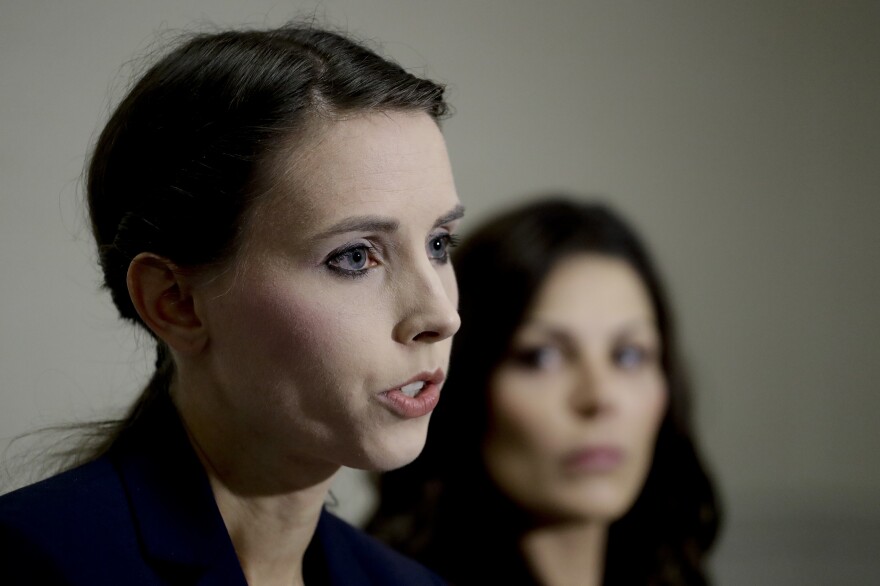Rachael Denhollander was 15 the first time she went to see Larry Nassar, then the doctor for USA Gymnastics. Denhollander didn't tell anyone of authority about how he sexually assaulted her until years later, in 2004, when she was working as a gymnastics coach.Nassar has admitted to sexually assaulting minors. He has been sentenced to 60 years in prison for charges related to child pornography, but has not yet been sentenced in a state case for sexually assaulting the athletes.The sentencing hearing for the Ingham County, Mich., case started on Tuesday. As NPR previously reported, before issuing Nassar's sentence, Judge Rosemarie Aquilina is giving all of those assaulted by Nassar a chance to speak. Olympic gold medalists Aly Raisman and Jordyn Wieber spoke on Friday and condemned the abuse and actions of Nassar, as well as what they see as the inaction and inability to protect athletes from USA Gymnastics and the U.S. Olympic Committee.Olympians Simone Biles, McKayla Maroney and Gabby Douglas also have said they are survivors of sexual abuse by Nassar.Denhollander was the first person to file a criminal complaint against Nassar in 2016. That led to more than 100 women coming forward saying they also had been victims of his abuse. Denhollander contacted The Indianapolis Star after the paper published an investigation about sexual abuse within USA Gymnastics.Denhollander testified for nearly three hours during the preliminary examination for the child pornography case against Nassar, and she will be the last of at least 120 women to speak during the sentencing hearing, which continues next week.She says while she's not sure of exactly what she will say, she will address Nassar and those watching."This is the greatest sexual assault scandal in sports history," Denhollander says. "Larry is arguably the most prolific pedophile in history. And it is imperative that we learn some very serious lessons from what has happened here."Denhollander spoke with All Things Considered host Mary Louise Kelly about the abuse she experienced, the trial and her feelings toward gymnastics today.This interview has been edited for length and clarity.
Interview Highlights
On women speaking at the sentencing hearingIt really is an empowering thing. It is an incredibly difficult thing to face your abuser, but to see all of these survivors able to stand up and to look Larry in the eye, and to speak the truth about what he did, and to put the shame and the blame and the guilt exactly where it belongs — on Larry and on Larry alone — is an incredible thing to witness.On when she first told someone about the abuse I first spoke up to an authority figure in 2004. I was coaching gymnastics at that point and one of the young gymnasts that I coached was going to be sent to him for treatment for hip pain. She was only 7 or 8, and I thought I couldn't let that happen. So I did disclose parts of the abuse — not all of it, but parts of the abuse — and told the coach at the gym that he had sexually assaulted me under the guise of treatment, and that no gymnast should be seeing him.On what happened when she spoke outThe response to that was not malicious in any way shape or form — I consider that coach a good friend still to this day — but she didn't know what to do with it. And so she did continue to send gymnasts to Larry up until the point that she stopped coaching at that gym.On if Nassar's behavior was an open secret Absolutely ... many of the dancers, the gymnasts, the people who saw him would talk about the treatments. And the conclusion was, "Well this must be medical treatment, because he'd never be allowed near us if it wasn't." And as a 15-year-old that was my thought process.As I lay on that exam table, it was very clear to me that this was something Larry did regularly. I knew if it was something Larry did regularly — that he was seeing girls every day, including our elite gymnasts — that there was no way someone had not described before what Larry was doing.And so the only conclusion that I could come to was that it had to be a legitimate medical treatment, because surely the adults that heard the description of what he was doing would have done something if it wasn't, and he would have never been near me. And that thought process caused me to lay still.On how she views gymnastics nowThe sexual assault itself does not color my view of gymnastics — I think it is an incredible, beautiful sport, that there is so much good that can come from it. But the way USA [Gymnastics] has created a culture in gymnastics absolutely has colored my view. Because the reality is that Larry is not the problem, Larry is the symptom of the problem. The reason Larry was able to have access to so many children for so long is because you had two major institutions who looked the other way.NPR's Kat Lonsdorf produced the audio for this story. NPR's Wynne Davis adapted it for Web. Copyright 2018 NPR. To see more, visit http://www.npr.org/.



